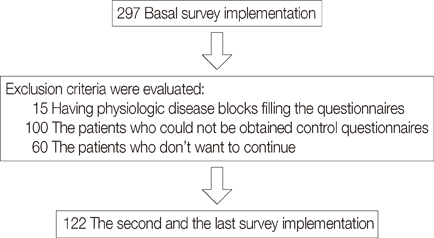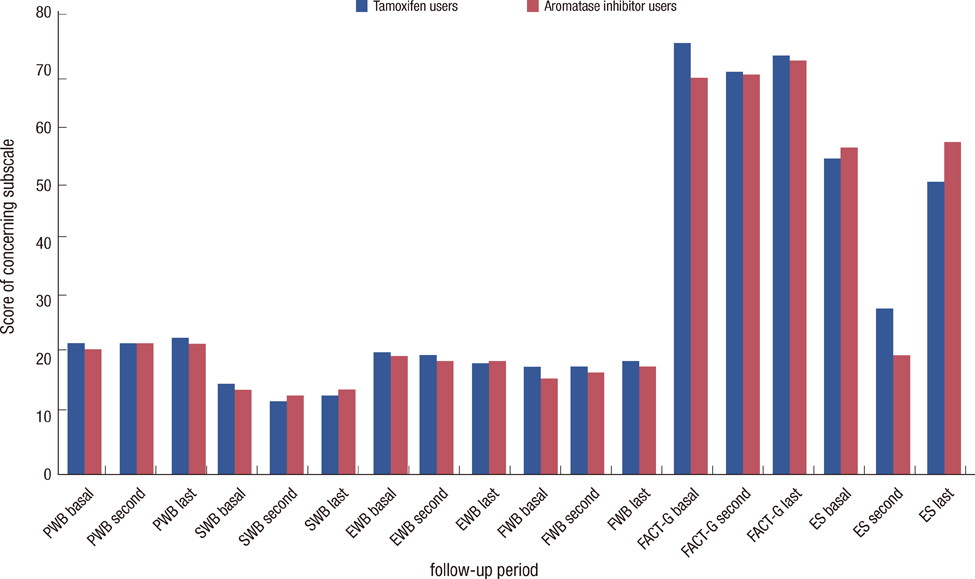J Breast Cancer.
2013 Jun;16(2):220-228. 10.4048/jbc.2013.16.2.220.
Quality of Life Assessment in Women with Breast Cancer: A Prospective Study Including Hormonal Therapy
- Affiliations
-
- 1Department of Radiation Oncology, Van Regional Training and Research Hospital, Van, Turkey. gracilis81@yahoo.com
- 2Department of Radiation Oncology, Medical School of Ege University, Izmir, Turkey.
- 3Department of Public Health, Medical School of Celal Bayar University, Manisa, Turkey.
- KMID: 2286405
- DOI: http://doi.org/10.4048/jbc.2013.16.2.220
Abstract
- PURPOSE
Evaluating the effect of hormonal treatment on quality of life (QoL) in breast cancer patients by using the Functional Assessment of Cancer Treatment (FACT) questionnaire is the main purpose of this trial.
METHODS
Breast cancer patients treated with adjuvant between January 2007 and December 2009 were evaluated. The first survey was done after patients completed their whole adjuvant treatment except for the hormonal therapy and this was as 'basal assessment.' The second survey was done 6 to 12 months after the basal surveys during their routine policlinic controls. The last survey was done within the last 18 to 24 months of the follow-up period.
RESULTS
The effect of marital status, number of pregnancies, residence in the village or city, hemoglobin levels, chemotherapy and hormonal therapy for any other reason except for breast cancer on the QoL could not be seen. Endocrine subscale scores were detected to be higher in patients aged >60 years than in younger ones. The other dimension scores were low in the elderly patient group. There was a statistically significant relationship between being >30 years old and improvement in the social well-being score (p=0.028). The functional well-being scores were found to be significantly higher in the patient group that had no comorbid disease (p=0.018). Endocrine subscale scores were statistically worse in patients who had psychiatric disease (p=0.057) but the general QoL data were similar with others. It was shown that all QoL scores for all dimensions had statistically significant changes (p<0.001) in terms of hormonal regimes.
CONCLUSION
The diagnosis of breast cancer was found to be an independent factor that affects social well-being and social life in a negative way. We must give attention to complaints including complaints about sexual life and hormonal status in order to ensure compliance of patients with the required hormonal regimens. By the help of future research, we can improve the prognosis of this disease through increased treatment adherence and belief of patients.
MeSH Terms
Figure
Reference
-
1. American Cancer Society. Breast Cancer Facts & Figures 2007-2008. Atlanta: American Cancer Society;2008. p. 2–8.2. Jemal A, Siegel R, Ward E, Murray T, Xu J, Smigal C, et al. Cancer statistics, 2006. CA Cancer J Clin. 2006; 56:106–130.
Article3. Lemieux J, Goodwin PJ, Bordeleau LJ, Lauzier S, Théberge V. Quality-of-life measurement in randomized clinical trials in breast cancer: an updated systematic review (2001-2009). J Natl Cancer Inst. 2011; 103:178–231.
Article4. Sloan JA, Cella D, Frost M, Guyatt GH, Sprangers M, Symonds T, et al. Assessing clinical significance in measuring oncology patient quality of life: introduction to the symposium, content overview, and definition of terms. Mayo Clin Proc. 2002; 77:367–370.
Article5. van der Steeg AF, De Vries J, Roukema JA. Quality of life and health status in breast carcinoma. Eur J Surg Oncol. 2004; 30:1051–1057.
Article6. Functional Assessment of Chronic Illness Therapy Questionnaires-v.4. Functional Assessment of Chronic Illness Therapy;2007. November 16th, 2007. http://www.facit.org/FACITOrg/Questionnaires.7. de Haes JC, Curran D, Aaronson NK, Fentiman IS. Quality of life in breast cancer patients aged over 70 years, participating in the EORTC 10850 randomised clinical trial. Eur J Cancer. 2003; 39:945–951.
Article8. Crivellari D, Bonetti M, Castiglione-Gertsch M, Gelber RD, Rudenstam CM, Thürlimann B, et al. Burdens and benefits of adjuvant cyclophosphamide, methotrexate, and fluorouracil and tamoxifen for elderly patients with breast cancer: the International Breast Cancer Study Group Trial VII. J Clin Oncol. 2000; 18:1412–1422.
Article9. Penttinen HM, Saarto T, Kellokumpu-Lehtinen P, Blomqvist C, Huovinen R, Kautiainen H, et al. Quality of life and physical performance and activity of breast cancer patients after adjuvant treatments. Psychooncology. 2011; 20:1211–1220.
Article10. Dorval M, Maunsell E, Deschênes L, Brisson J. Type of mastectomy and quality of life for long term breast carcinoma survivors. Cancer. 1998; 83:2130–2138.
Article11. Janni W, Rjosk D, Dimpfl TH, Haertl K, Strobl B, Hepp F, et al. Quality of life influenced by primary surgical treatment for stage I-III breast cancer-long-term follow-up of a matched-pair analysis. Ann Surg Oncol. 2001; 8:542–548.
Article12. Veronesi U, Paganelli G, Viale G, Luini A, Zurrida S, Galimberti V, et al. A randomized comparison of sentinel-node biopsy with routine axillary dissection in breast cancer. N Engl J Med. 2003; 349:546–553.
Article13. Ohsumi S, Shimozuma K, Kuroi K, Ono M, Imai H. Quality of life of breast cancer patients and types of surgery for breast cancer: current status and unresolved issues. Breast Cancer. 2007; 14:66–73.
Article14. Fallowfield L, Cella D, Cuzick J, Francis S, Locker G, Howell A. Quality of life of postmenopausal women in the Arimidex, Tamoxifen, Alone or in Combination (ATAC) Adjuvant Breast Cancer Trial. J Clin Oncol. 2004; 22:4261–4271.
Article15. Cella D, Fallowfield L. Five-year quality of life (QOL) follow-up of adjuvant endocrine therapy for postmenopausal women in the arimidex (A), tamoxifen (T), alone or in combination (ATAC) trial. J Clin Oncol. 2005; 23:16 Suppl. 577.
Article16. Cella D, Fallowfield L, Barker P, Cuzick J, Locker G, Howell A, et al. Quality of life of postmenopausal women in the ATAC ("Arimidex", tamoxifen, alone or in combination) trial after completion of 5 years' adjuvant treatment for early breast cancer. Breast Cancer Res Treat. 2006; 100:273–284.
Article17. Fallowfield LJ, Bliss JM, Porter LS, Price MH, Snowdon CF, Jones SE, et al. Quality of life in the intergroup exemestane study: a randomized trial of exemestane versus continued tamoxifen after 2 to 3 years of tamoxifen in postmenopausal women with primary breast cancer. J Clin Oncol. 2006; 24:910–917.
Article18. Whelan TJ, Goss PE, Ingle JN, Pater JL, Tu D, Pritchard K, et al. Assessment of quality of life in MA.17: a randomized, placebo-controlled trial of letrozole after 5 years of tamoxifen in postmenopausal women. J Clin Oncol. 2005; 23:6931–6940.
Article19. Fallowfield LJ, Leaity SK, Howell A, Benson S, Cella D. Assessment of quality of life in women undergoing hormonal therapy for breast cancer: validation of an endocrine symptom subscale for the FACT-B. Breast Cancer Res Treat. 1999; 55:189–199.
Article
- Full Text Links
- Actions
-
Cited
- CITED
-
- Close
- Share
- Similar articles
-
- Impact of Cognitive Function and Cancer Coping on Quality of Life among Women with Post-chemotherapy Breast Cancer
- Effect of Adjuvant Hormonal Therapy on the Development of Pulmonary Fibrosis after Postoperative Radiotherapy for Breast Cancer
- Predictors of Quality of Life in Women with Breast Cancer
- Factors Influencing Quality of Life in Patients with Breast Cancer on Hormone Therapy
- Distress and Quality of Life in Breast Cancer Survivors in Korea



